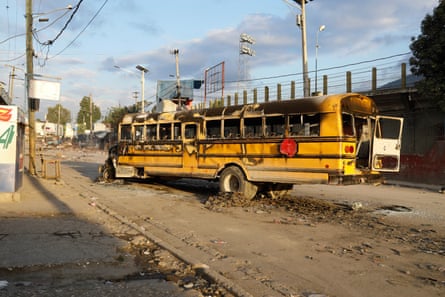Haitian armed gangs are recruiting starving children to swell their ranks ahead of an anticipated long and bloody battle with international security forces, a report from Human Rights Watch (HRW) has found.
Armed groups – which control most of Haiti – are enticing hundreds, if not thousands, of impoverished children to take up arms with offers of food and shelter, the rights groups said.
HRW says that up to 30% of Haitian gang members are now children forced into illegal activities as armed soldiers or spies or exploited for sex.
“All the sources we consulted, including children associated with criminal groups, told us that more children are joining the gangs and that it is in preparation to have more personnel available to fight against the international security forces and the Haitian police,” the report’s author, Nathalye Cotrino, told the Guardian. “Eventually, they plan to use children as ‘human shields’ if operations against criminal groups begin in their controlled areas.”
Haiti has fallen into ever-growing chaos and desperation since its president, Jovenel Moïse, was assassinated in July 2021. Across the country, 5.4 million people are regularly going hungry and 2.7 million – including half a million children – are under the dominion of violent armed groups.
Kenya deployed the first contingent of a UN-backed security force intended to restore order to the Caribbean nation in June but momentum has stalled due to a lack of funding, allowing armed groups to bolster their forces in the expectation of drawn-out gun battles over territory.
Last week, the Gran Grif gang massacred 70 people, including some children, in the western town of Pont-Sondé, as it went from house to house unchecked, executing civilians and torching buildings in what the gang’s leader, Luckson Elan, said was retribution for civilians not stopping police and vigilante groups from killing his combatants. Six thousand people were forced to flee the agricultural town, where rival factions are warring for control of the country’s breadbasket.
Gang leaders were publishing videos on TikTok that portrayed them living glamorous lives full of cash, women and flashy jewellery to lure in impressionable teenagers, Cotrino said.
“This attracts the attention of children living in poverty who are often homeless and going days without food. They see it as their only way out of misery,” she said.
Children are often exploited as informants, as they are less conspicuous, but are also forced to carry out extortion and violent crimes such as kidnapping and murder.
Girls are often forced to cook, clean and offer their bodies to gang leaders.
Children interviewed by HRW said they joined the gangs when they were desperate and hungry, but once they had picked up a machine gun there was no way out.

A 14-year-old member of the Tibwa gang – one of the more than 200 criminal groups competing for control of Haiti – told HRW: “Once, they told me to blindfold someone we were going to kidnap. When I refused to do it, they hit me in the head with a baseball bat and said if I didn’t, they would kill me.”
HRW has called for the government to launch programmes to safeguard children and help them demobilise and reintegrate into society.
Aid organisations on the ground say it is challenging to stop minors from being lured into gangs, given Haiti’s state services have all but collapsed, hunger continues to grow and schools are frequently closed.
One humanitarian worker at an educational centre on the edge of Port-au-Prince said it was easy to identify the children once they were in the orbit of criminal groups but it was far more difficult to get them back out.
“Generally, the children start coming in with new clothes, like shoes or jackets, or with small amounts of cash,” the aid worker said. “They also start to withdraw from activities and begin to miss days – at first, one or two days, and then a week – if they return at all. When we notice this, we immediately start a conversation with the child to find out what’s going on. The response is almost always the same. They say, ‘I have to support myself, and they, the gangs, are the only option.’”
Source: theguardian.com
















